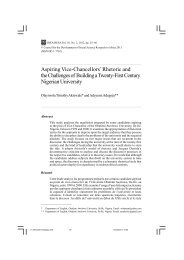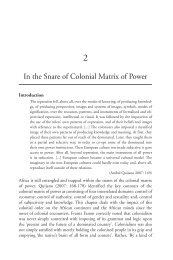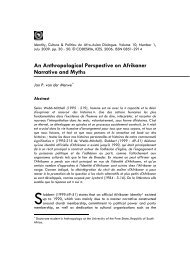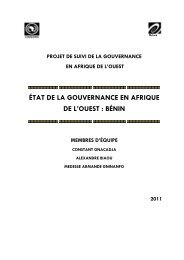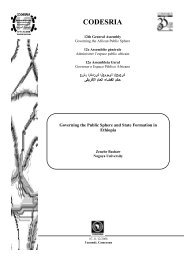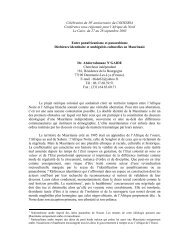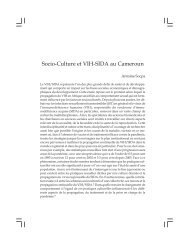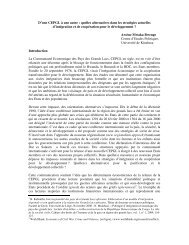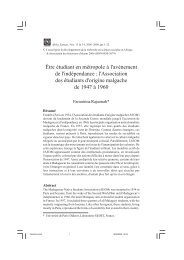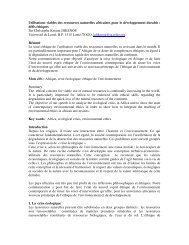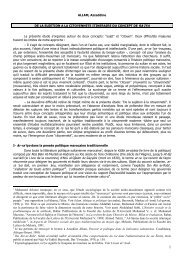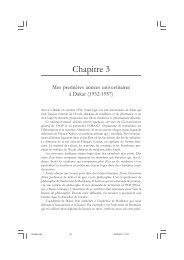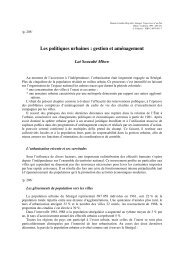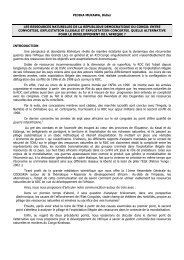Land and Agrarian Reform in Former Settler Colonial ... - codesria
Land and Agrarian Reform in Former Settler Colonial ... - codesria
Land and Agrarian Reform in Former Settler Colonial ... - codesria
Create successful ePaper yourself
Turn your PDF publications into a flip-book with our unique Google optimized e-Paper software.
Murisa: Social Organisation <strong>in</strong> the Aftermath of ‘Fast Track’<br />
253<br />
processes, which elevated the authority of traditional structures. Post<strong>in</strong>dependence<br />
local governance reform effort <strong>in</strong> Communal Areas sought to<br />
limit the authority of traditional authority structures (Tshuma 1997), through<br />
the <strong>in</strong>troduction of representative structures such as the Village Development<br />
Committee (VIDCO) <strong>and</strong> Rural District Council (RDC), although such<br />
elected structures were rarely effective <strong>in</strong> address<strong>in</strong>g the various grievances<br />
of rural communities. Instead, hereditary structures of power cont<strong>in</strong>ued to<br />
<strong>in</strong>fluence the allocation of critical resources such as l<strong>and</strong> s<strong>in</strong>ce their authority<br />
was perceived, at times, to be superior to that of elected functionaries.<br />
Post- <strong>in</strong>dependence rural social organization was shaped by four important<br />
developments: (i) slow movement on l<strong>and</strong> reforms <strong>and</strong> economic development,<br />
(ii) local government reforms, (iii) restructur<strong>in</strong>g of representative farmers’<br />
unions <strong>and</strong> (iv) the emergence <strong>and</strong> proliferation of non-state development<br />
agents <strong>in</strong> the form of NGOs <strong>and</strong> locally established voluntary Community<br />
Based Organisations (CBOs).<br />
Evolution of forms of social organisation <strong>in</strong> rural Zimbabwe<br />
The discussion <strong>in</strong> this section briefly exam<strong>in</strong>es the evolution of social<br />
organisation from the period of colonisation up to <strong>in</strong>dependence. Historically,<br />
social relations of production <strong>in</strong> Zimbabwe, like those <strong>in</strong> most of Africa, were<br />
structured around belong<strong>in</strong>g with<strong>in</strong> a def<strong>in</strong>ed l<strong>in</strong>eage group<strong>in</strong>g that ensured<br />
access to l<strong>and</strong> <strong>and</strong> related benefits (Adholla 1962: 23). Changes <strong>in</strong> the structures<br />
of the political economy from around 1903 accelerated the <strong>in</strong>tegration of the<br />
majority black <strong>in</strong>digenous population <strong>in</strong>to the wage economy. The structural<br />
determ<strong>in</strong>ants of the proletarianisation process <strong>in</strong> the Rhodesian context<br />
were: dim<strong>in</strong>ish<strong>in</strong>g access to l<strong>and</strong>, <strong>in</strong>creas<strong>in</strong>g taxation <strong>and</strong> the <strong>in</strong>roads made<br />
by a government-protected <strong>and</strong> competitive white commercial agricultural<br />
sector (Van Onselen 1976). There was a gradual <strong>in</strong>crease <strong>in</strong> the number of<br />
workers from 10,000 <strong>in</strong> 1909 to about 320,000 <strong>in</strong> 2000 (see Chambati <strong>and</strong><br />
Moyo 2003; Chambati, Chapter 5). De Janvry (1981) observes that, under<br />
such conditions, rural labourers are prevented from gett<strong>in</strong>g access to l<strong>and</strong> as<br />
freeholders <strong>and</strong> from captur<strong>in</strong>g their opportunity cost on labour markets so<br />
as to make them dependent on both sectors of the economy.<br />
The labour process came to be characterised by an endur<strong>in</strong>g contradiction<br />
between proletarianisation <strong>and</strong> a politically eng<strong>in</strong>eered functional dualism, by<br />
which petty commodity production <strong>in</strong> the Communal Areas <strong>and</strong> unwaged labour<br />
(especially female <strong>and</strong> child labour) would subsidise the social reproduction of<br />
male labour power on m<strong>in</strong>es <strong>and</strong> farms (Moyo <strong>and</strong> Yeros 2005).<br />
<strong>L<strong>and</strong></strong> <strong>and</strong> <strong>Agrarian</strong> <strong>Reform</strong> <strong>in</strong> <strong>Former</strong> <strong>Settler</strong> <strong>Colonial</strong> Zimbabwe.<strong>in</strong>dd 253 28/03/2013 12:57:27



